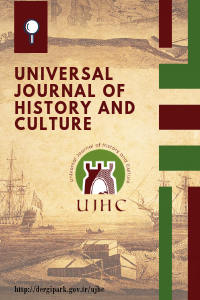
Universal Journal of History and Culture
Yazarlar: Emre AMİR
Konular:Tarih
Anahtar Kelimeler:Tarih,Uluslararası İlişkiler,Russia,Roma,Ortodoks,SSCB,Hristiyanlık
Özet: This study discusses how and why Russia that constitutes the largest part of Asia made Orthodox Christianity its upper identity and on which historical background constructed it as its foreign policy together with the 3rd Rome rhetoric. Although Russia is one of the extreme examples of the realist paradigm in the international relations discipline, Orthodox Christianity is used as soft power as one of the most important tools of foreign policy regarding the neighbouring countries and the Middle East. On the other hand, even though communist ideology replaces the former religious outlook, Orthodox Christianity is an important part of the foreign policy of USSR as well, because it is seen that the state does not interfere with the Church. With this information, this study shows that it is impossible to think of a 3rd Rome rhetoric and the imagined Russian supremacy in the world without Orthodox Christianity as an upper identity and that knowing the history of Orthodox Christianity is very crucial to predict the moves in Russian foreign policy.